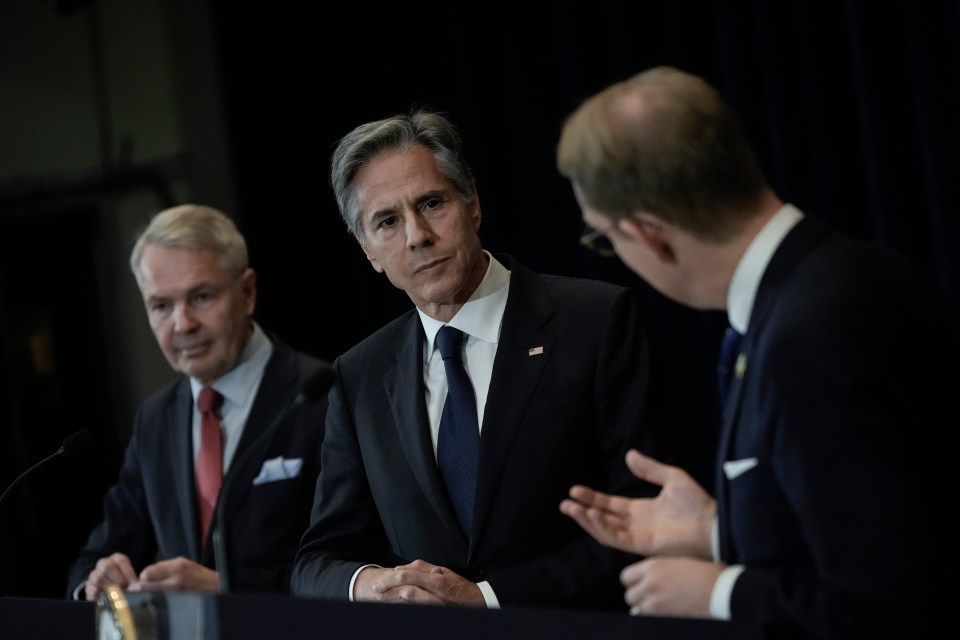Finland’s accession to Nato backs Russia in a corner but it won’t end war in Ukraine

Finland has joined NATO, in a very positive development in the West’s fight against Putin’s barbaric regime. But there’s much more to be done to support Ukraine, writes Daniel Sleat
Last week, there was a historic shift in the power dynamic in Europe: Nato’s border with Russia doubled, almost overnight, as Finland joined the defence alliance. It is precisely the increased Western influence in the region Russia invaded Ukraine to try to prevent. Instead, the Kremlin is on the back foot internationally, under increased pressure at home and struggling to turn around the disastrous campaign in Ukraine itself. All of this leaves Putin weakened. Potentially even fatally so.
Unfortunately, it won’t be a slow death. While pressure is mounting on Putin on both the pro and anti-war fronts at home, there is no clear successor. Crucially, there is also no clear alternative path for a new leader in prosecuting the war in Ukraine. Russia’s military struggles are now endemic. But the West should by no means just wait and see what happens in Moscow. Our efforts to help Ukraine and isolate Russia were never going to be a one-off show of support. Finland’s accession to Nato has the potential to take a war of diplomatic attrition to an acute turning point.
On every level the invasion of Ukraine has been a disaster for Putin. Since last February Russia has suffered up to 200,000 casualties. While the territory it controls in Ukraine is greater than pre-invasion, the Kremlin’s war aims have not been met. When Putin decided to launch the full-scale invasion of Ukraine he expected a lightning victory. He expected the West to be wrong-footed and weakened, and countries in a similar position to Ukraine, such as Moldova, to be deterred from closer ties with Europe. None of this has happened. On the contrary, it is Russia now isolated, the West united and countries in the region increasingly looking to the West and Nato for security. In 2003 9 per cent of Finns supported Nato membership compared with non-alignment. By last autumn, in light of Russia’s invasion, this number rose to 59 per cent.
The pressure on Putin has mounted not just internationally but at home too. Recent reports from within Russia paint a picture of an increasingly isolated Putin, deeply concerned about the survival of his regime. Passports of senior Russian officials have been confiscated to avoid them fleeing Russia. The economy has weathered the storm of sanctions better than expected but the oil price cap could bite this year. Domestic opposition to Putin has ramped up on both his flanks: those opposed to the war and those who agree with it but think it has been prosecuted badly. Further conscription within the country risks fatally damaging support for the war among the wider public.
This doesn’t put Putin’s in the last, existential throes of his leadership. There is still no credible alternative. There is also no clear path forward for a different leader on how to conduct the war in Ukraine. There appear very few options for how to better conduct the war, given the position Russia is in on the ground. Neither could a different leader afford to withdraw. No credible alternative, no credible path to end the war. So, for now, we, and Russia, appear stuck with Putin.
Stuck, but not powerless; we don’t know at what point the balance of power against Putin will shift decisively, but we can ensure maximum pressure is put on the regime.
This requires a renewed two-prong multi-domain approach. First, the West needs a coordinated and united strategy to support Ukraine in its upcoming Spring offensive which will likely be focussed on the land corridor between Russia and Crimea. Providing ongoing assistance and training can deliver a strategy to both help end the war, and implement Ukraine’s post-conflict vision.
We need to ensure pressure is kept on Russia internationally. After Finland’s accession, Sweden will now come into focus, for instance, with their membership now a priority.
Finally, the West needs to ensure it is properly focussed on understanding Russia’s international role, particularly in its region, and supporting those surrounding states such as Moldova and Georgia, who could become the new frontline of Russian interference.